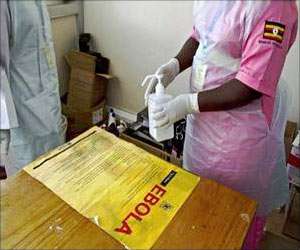
The Guinean government has now asked the institute and its collaboration partner Toshiba to supply equipment to roll out the test, he added.
The test hinges on what the researchers have called a "primer", a substance that amplifies only those genes specific to the Ebola virus found in a blood sample or other bodily fluid.
Using existing techniques, ribonucleic acid (RNA) -- biological molecules used in the coding of genes -- is extracted from any viruses present in a sample.
This is then used to synthesize the viral DNA, which can be mixed with the primer and then heated to 60-65 degrees Celsius (140-149 Fahrenheit).
If Ebola is present, DNA specific to the virus is amplified by the action of the primers. The by-products from the process cause the liquid to become cloudy, providing visual confirmation, Yasuda said.
Advertisement
The Ebola virus, transmitted through contact with infected bodily fluids, has killed more than 10,000 people in western Africa since it re-emerged in December 2013.
Advertisement













